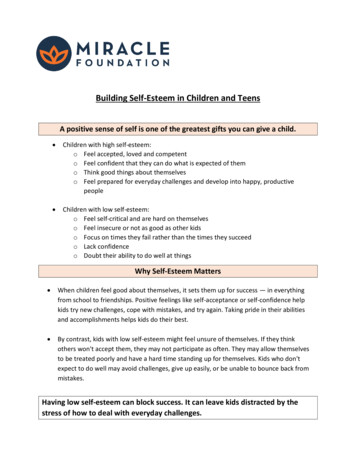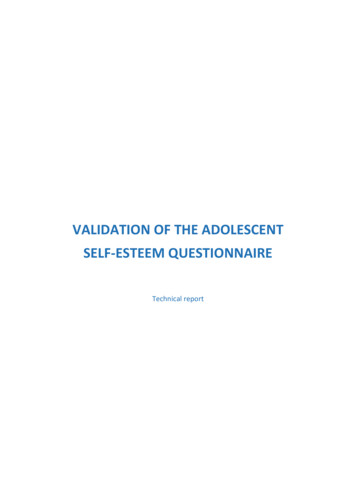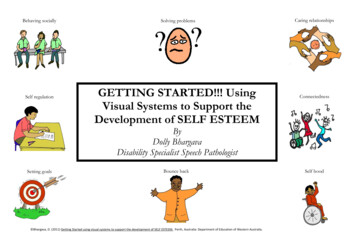
Transcription
Building Self-Esteem in Children and TeensA positive sense of self is one of the greatest gifts you can give a child. Children with high self-esteem:o Feel accepted, loved and competento Feel confident that they can do what is expected of themo Think good things about themselveso Feel prepared for everyday challenges and develop into happy, productivepeople Children with low self-esteem:o Feel self-critical and are hard on themselveso Feel insecure or not as good as other kidso Focus on times they fail rather than the times they succeedo Lack confidenceo Doubt their ability to do well at thingsWhy Self-Esteem Matters When children feel good about themselves, it sets them up for success — in everythingfrom school to friendships. Positive feelings like self-acceptance or self-confidence helpkids try new challenges, cope with mistakes, and try again. Taking pride in their abilitiesand accomplishments helps kids do their best. By contrast, kids with low self-esteem might feel unsure of themselves. If they thinkothers won't accept them, they may not participate as often. They may allow themselvesto be treated poorly and have a hard time standing up for themselves. Kids who don'texpect to do well may avoid challenges, give up easily, or be unable to bounce back frommistakes.Having low self-esteem can block success. It can leave kids distracted by thestress of how to deal with everyday challenges.
How Self-Esteem Develops Contrary to what some might think, self-esteem does not come just by telling kids they'rewonderful, special, and great (even though they are!). Self-esteem is the result of experiences that help a child feel capable, effective, andaccepted.o When kids learn to do things for themselves and feel proud of what they can do,they feel capable.o Children feel effective when they see that good things come from efforts like tryinghard, getting close to a goal, or making progress.o When kids feel accepted and understood by a caregiver or someone close, they arelikely to accept themselves, too. Their good feelings about themselves multiply ascaregivers praise good behaviors, help when needed, and give encouragement andsupport.Self-esteem develops over time. And if it’s low, it can be raised.Helping Children Develop Self-Esteem Help children learn to do new things. At every age, there are new things for kids tolearn. Show and help them first, then let them do what they can, even if they makemistakes. Be sure the child has many opportunities to learn, try, and feel proud – itincreases their feelings of competency and confidence, and builds their problem solvingskills. Give children choices. To build confidence in the world, kids have to take chances, makechoices and take responsibility for them. Giving choices – within a reasonable set ofoptions offered by you – makes them feel empowered. Choices may be simple whenyoung, but they will prepare the child for more difficult choices as they get older. Let children know that no one is perfect. And explain that no one expects the child tobe. The way you react to the child’s mistakes and disappointments impact how the childwill react.Offer sincere praise. o Praise the child often, but be specific in your compliments. For example, insteadof reacting to their drawing with “You’re the best artist in the world,” try@MiracleFoundation2021
something like “I really like how you drew the whole group. You even includeddetails like Priya’s curly hair.”o Children will see through insincere praise, so avoid it. For example, telling a childthey played a great game when they know they didn’t feels fake. It’s better tosay, “I know that wasn’t your best game, but we all have bad days. I’m proud ofyou for not giving up.”o Praise effort. Offer most of your praise for effort, progress, and attitude. Forexample, “You’re working really hard on that project,” or “You’re getting betterand better at reading,” or “I’m really proud of you for having such a greatattitude.” This kind of praise encourages kids to put effort into things and towork toward goals, and they are more likely to succeed. Ban harsh criticism. The messages kids hear about themselves from others easilytranslate into how they feel about themselves. Harsh words ("You're so lazy!") areharmful, not motivating. When kids absorb negative messages about themselves, theyfeel bad about themselves, and act accordingly. Focus on strengths. Pay attention to what the child does well and enjoys. Make sure thechild has opportunities to develop these strengths. Nurturing strengths is better thanfocusing on weaknesses if you want to help kids feel good about themselves andsucceed. Teach the child to make positive self-statements. Self-talk is very important ineverything we do. Psychologists have found that negative self-talk is behind depressionand anxiety. What we think determines how we feel, and how we feel determines howwe behave. Therefore, it is important to teach children to be positive about how they“talk to themselves.”o Some examples of useful self-talk are: “I can get this problem, if I just keeptrying.” “It’s OK if our team lost today. We all tried our best and you can’t winthem all.” “It makes me feel good to help others even if the person doesn’tnotice or thank me.”@MiracleFoundation2021
What to do when Children Struggle or FailMake clear that your love is unconditional. Let the children know you love them even whenthey fail or make bad decisions. Mistakes are all a part of the learning process.Make sure the child’s goal are within reach, at a level appropriate for their ability. It may bemore important for them to take a step down or back to feel success rather than to work atthe higher level.Offer appropriate praise for their efforts and attitude, especially when they are struggling.Discussing Self-Esteem with Children and TeensAll children, not just those involved in counseling, could benefit from a discussion on selfesteem and its impact on their happiness and success. You may use the resources on thefollowing pages when working with a child suffering from low self-esteem.@MiracleFoundation2021
Resources for Working with Children on Self-EsteemUse the following checklist to determine the child’s level of self-esteem. Generate discussionwith the child regarding the question at the bottom of the form.@MiracleFoundation2021
Use this journal to help the child focus on their positives and strengths.@MiracleFoundation2021
Self-esteem is the result of experiences that help a child feel capable, effective, and accepted. o When kids learn to do things for themselves and feel proud of what they can do, they feel capable. o Children feel effective when they see that good things come from efforts like trying hard, getting close to a goal, or making progress. .











